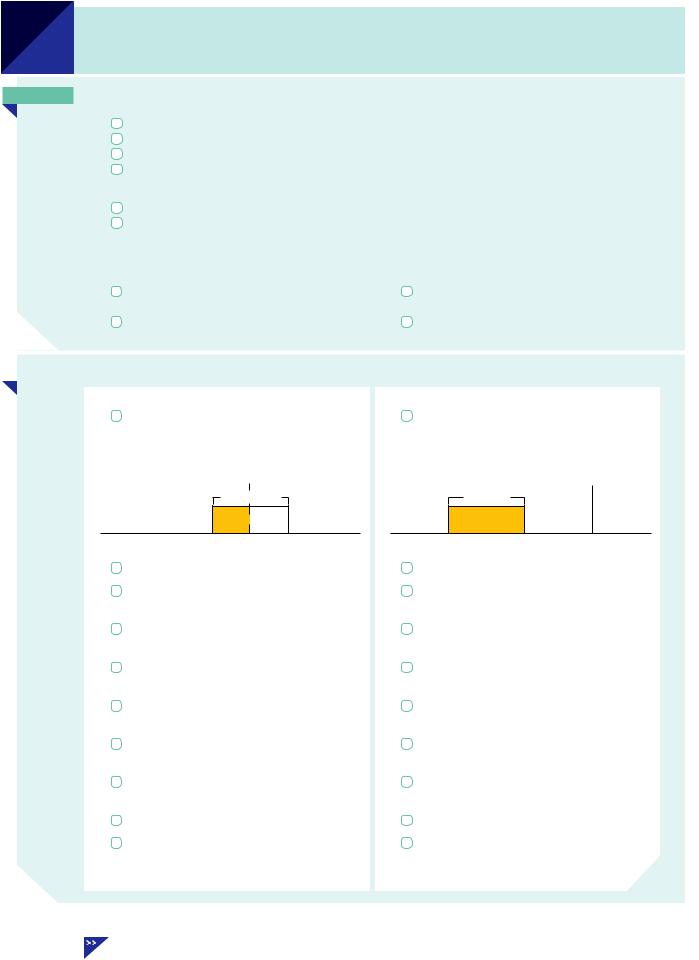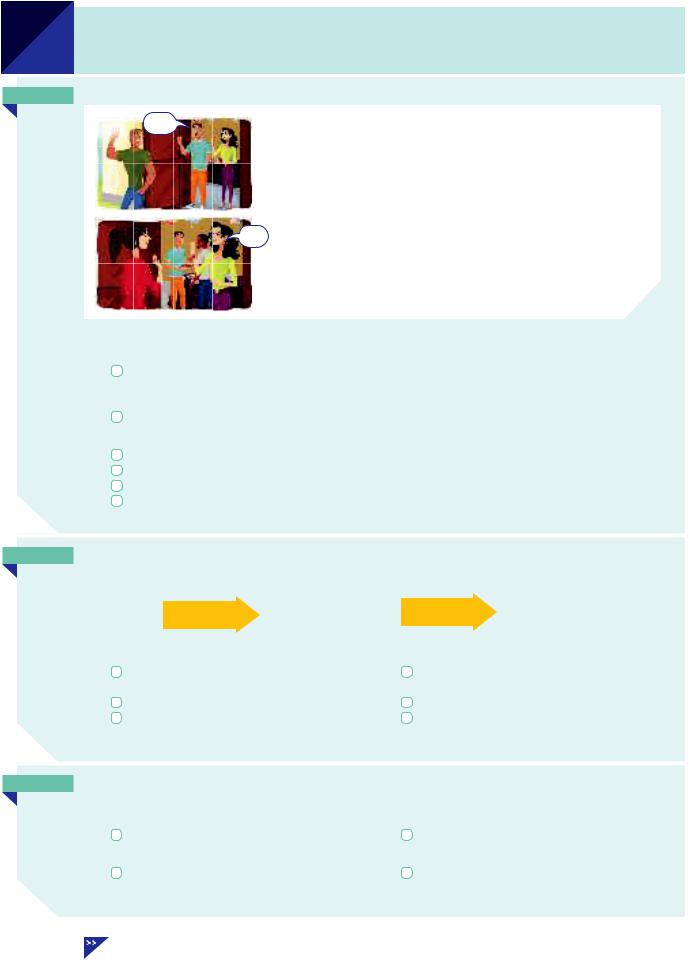
- •Contents
- •Thanks
- •To the student
- •To the teacher
- •3 Present continuous and present simple 1 (I am doing and I do)
- •10 Present perfect continuous and simple (I have been doing and I have done)
- •11 how long have you (been) … ?
- •12 for and since when … ? and how long … ?
- •13 Present perfect and past 1 (I have done and I did)
- •14 Present perfect and past 2 (I have done and I did)
- •15 Past perfect (I had done)
- •16 Past perfect continuous (I had been doing)
- •17 have and have got
- •18 used to (do)
- •19 Present tenses (I am doing / I do) for the future
- •20 I’m going to (do)
- •21 will and shall 1
- •22 will and shall 2
- •23 I will and I’m going to
- •24 will be doing and will have done
- •26 can, could and (be) able to
- •27 could (do) and could have (done)
- •28 must and can’t
- •29 may and might 1
- •30 may and might 2
- •31 have to and must
- •32 must mustn’t needn’t
- •33 should 1
- •34 should 2
- •35 I’d better … it’s time …
- •36 would
- •39 if I knew … I wish I knew …
- •40 if I had known … I wish I had known …
- •41 wish
- •42 Passive 1 (is done / was done)
- •43 Passive 2 (be done / been done / being done)
- •44 Passive 3
- •45 it is said that … he is said to … he is supposed to …
- •46 have something done
- •47 Reported speech 1 (he said that …)
- •48 Reported speech 2
- •49 Questions 1
- •52 Question tags (do you? isn’t it? etc.)
- •53 Verb + -ing (enjoy doing / stop doing etc.)
- •54 Verb + to … (decide to … / forget to … etc.)
- •55 Verb (+ object) + to … (I want you to …)
- •56 Verb + -ing or to … 1 (remember, regret etc.)
- •57 Verb + -ing or to … 2 (try, need, help)
- •58 Verb + -ing or to … 3 (like / would like etc.)
- •59 prefer and would rather
- •60 Preposition (in/for/about etc.) + -ing
- •61 be/get used to … (I’m used to …)
- •63 there’s no point in -ing, it’s worth -ing etc.
- •64 to … , for … and so that …
- •65 Adjective + to …
- •66 to … (afraid to do) and preposition + -ing (afraid of -ing)
- •67 see somebody do and see somebody doing
- •68 -ing clauses (He hurt his knee playing football.)
- •69 Countable and uncountable 1
- •70 Countable and uncountable 2
- •71 Countable nouns with a/an and some
- •74 the 2 (school / the school etc.)
- •75 the 3 (children / the children)
- •77 Names with and without the 1
- •78 Names with and without the 2
- •79 Singular and plural
- •80 Noun + noun (a bus driver / a headache)
- •81 -’s (your sister’s name) and of … (the name of the book)
- •82 myself/yourself/themselves etc.
- •83 a friend of mine my own house on my own / by myself
- •84 there … and it …
- •85 some and any
- •87 much, many, little, few, a lot, plenty
- •90 all every whole
- •91 each and every
- •92 Relative clauses 1: clauses with who/that/which
- •94 Relative clauses 3: whose/whom/where
- •95 Relative clauses 4: extra information clauses (1)
- •96 Relative clauses 5: extra information clauses (2)
- •97 -ing and -ed clauses (the woman talking to Tom, the boy injured in the accident)
- •98 Adjectives ending in -ing and -ed (boring/bored etc.)
- •99 Adjectives: a nice new house, you look tired
- •100 Adjectives and adverbs 1 (quick/quickly)
- •102 so and such
- •104 quite, pretty, rather and fairly
- •105 Comparative 1 (cheaper, more expensive etc.)
- •106 Comparative 2 (much better / any better etc.)
- •107 Comparative 3 (as … as / than)
- •108 Superlative (the longest / the most enjoyable etc.)
- •109 Word order 1: verb + object; place and time
- •110 Word order 2: adverbs with the verb
- •111 still any more yet already
- •112 even
- •114 in case
- •116 as (as I walked … / as I was … etc.)
- •117 like and as
- •119 during for while
- •121 at/on/in (time)
- •122 on time and in time at the end and in the end
- •123 in/at/on (position) 1
- •124 in/at/on (position) 2
- •125 in/at/on (position) 3
- •126 to, at, in and into
- •127 in/on/at (other uses)
- •129 Noun + preposition (reason for, cause of etc.)
- •130 Adjective + preposition 1
- •131 Adjective + preposition 2
- •132 Verb + preposition 1 to and at
- •134 Verb + preposition 3 about and of
- •135 Verb + preposition 4 of/for/from/on
- •136 Verb + preposition 5 in/into/with/to/on
- •137 Phrasal verbs 1 Introduction
- •138 Phrasal verbs 2 in/out
- •139 Phrasal verbs 3 out
- •142 Phrasal verbs 6 up/down
- •143 Phrasal verbs 7 up (1)
- •144 Phrasal verbs 8 up (2)
- •145 Phrasal verbs 9 away/back
- •Additional exercises
- •Study guide
- •Key to Exercises
- •Key to Additional exercises (see page 302)
- •Key to Study guide
- •Index

Unit
14 Present perfect and past 2 (I have done and I did)
AWe do not use the present perfect (I have done) when we talk about a finished time (for example,
yesterday / last year / ten minutes ago etc.). We use a past tense:
It was very cold yesterday. (not has been)
Paul and Lucy arrived ten minutes ago. (not have arrived)
Did you eat a lot of sweets when you were a child? (not have you eaten) I got home late last night. I was very tired and went straight to bed.
Use the past to ask When … ? or What time … ? :
When did your friends arrive? (not have … arrived)
What time did you finish work?
Compare:
|
|
|
|
|
|
|
Present perfect |
|
Past simple |
|
|
Tom has lost his key. He can’t get |
|
Tom lost his key yesterday. |
|
|
into the house. |
|
He couldn’t get into the house. |
|
|
Is Carla here or has she let? |
|
When did Carla leave? |
|
|
|
|
|
|
|
Compare: |
|
|
|
|
|
|
|
B |
|
|
|
|
Present perfect (have done)
I’ve done a lot of work today.
We use the present perfect for a period of time that continues until now. For example: today / this week / since 2010.
unfinished
today
past |
now |
It hasn’t rained this week.
Have you seen Anna this morning? (it is still morning now)
Have you seen Ben recently? (in the last few days or weeks)
I’ve been working here since 2010. (I still work here now)
I don’t know where Lisa is. I haven’t seen her. (= I haven’t seen her recently)
We’ve been waiting for an hour. (we are still waiting now)
Jack lives in Los Angeles. He has lived there for seven years.
I’ve never ridden a horse. (in my life)
It’s the last day of your holiday. You say: It’s been a really good holiday. I’ve really enjoyed it.
Past simple (did)
I did a lot of work yesterday.
We use the past simple for a finished time in the past. For example:
yesterday / last week / from 2010 to 2014.
finished
yesterday
past |
now |
It didn’t rain last week.
Did you see Anna this morning?
(it is now aternoon or evening)
Did you see Ben on Sunday?
I worked here from 2010 to 2014. (I don’t work here now)
a: Was Lisa at the party on Sunday? b: I don’t think so. I didn’t see her.
We waited (or were waiting) for an hour. (we are no longer waiting)
Jack lived in New York for ten years. Now he lives in Los Angeles.
I never rode a bike when I was a child.
Ater you come back from holiday you say: It was a really good holiday. I really enjoyed it.
28 |
Past simple Unit 5 Present perfect Units 7–8 Present perfect and past 1 Unit 13 |

Exercises
14.1 Are the underlined parts of these sentences OK? Correct them where necessary.
1 I’ve lost my key. I can’t find it anywhere.
2 Have you eaten a lot of sweets when you were a child? 3 I’ve bought a new car. You must come and see it.
4 I’ve bought a new car last week.
5 Where have you been yesterday evening?
6 Maria has let school in 1999.
7 I’m looking for Mike. Have you seen him?
8 ‘Have you been to Paris?’ ‘Yes, many times.’ 9 I’m very hungry. I haven’t eaten much today.
OK
Did you eat
10When has this bridge been built?
14.2Make sentences from the words in brackets. Use the present perfect or past simple.
1 (it / not / rain / this week) It hasn’t rained this week.
2 (the weather / be / cold / recently) The weather 3 (it / cold / last week) It
4 (I / not / eat / any fruit yesterday) I 5 (I / not / eat / any fruit today)
6 (Emily / earn / a lot of money / this year) 7 (she / not / earn / so much / last year)
8 (you / have / a holiday recently?)
14.3Put the verb into the correct form, present perfect or past simple.
1 |
I haven’t been |
(I / not / be) to Canada, but I’d like to go there. |
|
|
2 |
Paul and Lucy arrived |
(arrive) about ten minutes ago. |
|
|
3 |
I’m tired. |
|
(I / not / sleep) well last night. |
|
4 |
|
|
(There / be) a bus drivers’ strike last week, so |
|
|
|
|
(there / be) no buses. |
|
5 |
Edward |
|
(work) in a bank for 15 years. Then |
|
|
(he / give) it up. Now he works as a gardener. |
|
||
6 |
Mary lives in Dublin. |
|
(She / live) there all her life. |
|
7 |
My grandfather |
|
(die) before I was born. |
|
|
(I / never / meet) him. |
|
|
|
8 |
I don’t know Karen’s husband. |
(I / never / meet) him. |
||
9 |
It’s nearly lunchtime, and |
(I / not / see) Martin all morning. I wonder |
||
|
where he is. |
|
|
|
10 |
a: |
|
(you / go) to the cinema last night? |
|
|
b: Yes, but the movie |
|
(be) awful. |
|
11 |
a: |
|
(It / be) very warm here since we arrived. |
|
|
b: Yes, |
|
(it / be) 35 degrees yesterday. |
|
12 |
a: Where do you live? |
|
|
b: In Boston. |
|
a: How long |
|
(you / live) there? |
b: Five years. |
|
a: Where |
|
(you / live) before that? |
b: In Chicago. |
|
a: And how long |
|
(you / live) in Chicago? |
b: Two years. |
14.4 Write sentences about yourself using the ideas in brackets.
1 (something you haven’t done today) I haven’t eaten any fruit today. 2 (something you haven’t done today)
3 (something you didn’t do yesterday)
4 (something you did yesterday evening)
5 (something you haven’t done recently)
6 (something you’ve done a lot recently)
Unit
14
Additional exercises 2–4 (pages 303–04), 14–15 (pages 310–11) |
29 |

Unit
15 Past perfect (I had done)
AStudy this example situation:
10.30 |
Bye! |
Sarah and Paul went to the same party last week, but they |
|
didn’t see each other. Paul let the party at 10.30 and Sarah |
|||
|
|||
|
|
||
|
|
arrived at 11 o’clock. |
|
|
|
So when Sarah arrived at the party, Paul wasn’t there. |
PAUL
11.00
SARAH
He had gone home.
had gone is the past perfect:
Hi! |
|
|
|
|
I/we/they/you |
|
(= I’d etc.) |
gone |
|
|
|
|||
|
had |
seen |
||
|
he/she/it |
(= he’d etc.) |
||
|
|
finished etc. |
||
|
|
|
|
|
|
|
|
|
|
The past perfect (simple) is had + past participle (gone/seen/finished etc.).
Sometimes we talk about something that happened in the past:
Sarah arrived at the party.
This is the starting point of the story. Then, if we want to talk about things that happened before this time, we use the past perfect (had …):
When Sarah arrived at the party, Paul had already gone home.
Some more examples:
When we got home last night, we found that somebody had broken into the flat.
Karen didn’t come to the cinema with us. She’d already seen the movie.
At first I thought I’d done the right thing, but I soon realised that I’d made a big mistake. The people sitting next to me on the plane were nervous. They hadn’t flown before. or They’d never flown before.
BCompare present perfect (have seen etc.) and past perfect (had seen etc.):
|
|
|
|
|
|
|
|
|
|
|
|
Present perfect |
|
|
|
|
Past perfect |
|
|
|
|||
|
have seen |
|
|
|
|
|
had seen |
|
|
|
|
|
|
|
|
|
|
|
|
|
|
|
|
|
past |
now |
|
|
past |
now |
|||||
|
Who is that woman? I’ve seen her before, |
|
|
I wasn’t sure who she was. I’d seen her |
|||||||
|
but I can’t remember where. |
|
|
before, but I couldn’t remember where. |
|||||||
|
We aren’t hungry. We’ve just had lunch. |
|
|
We weren’t hungry. We’d just had lunch. |
|||||||
|
The house is dirty. They haven’t cleaned |
|
|
The house was dirty. They hadn’t |
|||||||
|
it for weeks. |
|
|
|
|
|
cleaned it for weeks. |
|
|
|
|
|
|
|
|
|
|
|
|
|
|
|
|
|
|
|
|
|
|
|
|
|
|
|
|
CCompare past simple (let, was etc.) and past perfect (had let, had been etc.):
|
|
|
Past simple |
|
Past perfect |
a: Was Tom there when you arrived? |
|
a: Was Tom there when you arrived? |
b: Yes, but he let soon aterwards. |
|
b: No, he’d already let. |
Kate wasn’t at home when I phoned. |
|
Kate had just got home when I phoned. |
She was at her mother’s house. |
|
She’d been at her mother’s house. |
|
|
|
|
|
|
30 |
Past perfect continuous Unit 16 Irregular verbs (gone/seen etc.) Appendix 1 |

Exercises |
Unit |
15 |
|
|
|
15.1 Read the situations and write sentences using the words in brackets.
1 There was a picture lying on the floor. (It / fall / of the wall)
2 The people sitting next to you on the plane were nervous. It was their first flight. (They / not / fly / before)
3You went back to your home town recently ater many years. It wasn’t the same as before. (It / change / a lot) It
4 Somebody sang a song. You didn’t know it. (I / not / hear / it / before) I
5I invited Rachel to the party, but she couldn’t come. (She / arrange / to do something else)
6You went to the cinema last night. You got to the cinema late. (The film / already / start)
7Last year we went to Mexico. It was our first time there. (We / not / be / there / before) We
8I met Daniel last week. It was good to see him again ater such a long time. (I / not / see / him for five years)
9I ofered my friends something to eat, but they weren’t hungry. (They / just / have / lunch)
10Sam played tennis yesterday. He wasn’t very good at it because it was his first game ever. (He / never / play / before)
15.2Use the sentences on the let to complete the paragraphs on the right. These sentences are in the order in which they happened – so (a) happened before (b), (b) before (c) etc. But your paragraph begins with the underlined sentence, so sometimes you need the past perfect.
1(a) Somebody broke into the ofice during the night.
(b)We arrived at work in the morning.
(c)We called the police.
2(a) Laura went out this morning.
(b)I rang her doorbell.
(c)There was no answer.
3(a) Joe came back from holiday a few days ago.
(b)I met him the same day.
(c)He looked very well.
4(a) James sent Amy lots of emails.
(b)She never replied to them.
(c)Yesterday he got a phone call from her.
(d)He was surprised.
We arrived at work in the morning and found
|
that somebody had broken |
into the ofice |
|
during the night. So we called the police. |
|
|
||
|
|
|
I went to Laura’s house this morning and rang |
||
|
her doorbell, but |
no answer. |
|
||
|
|
out. |
|
|
|
|
I met Joe a few days ago. |
just |
|
|
holiday. |
|
|
|
|
very well. |
|
|
|
|
Yesterday James
|
from Amy. |
surprised. |
|
|
|||
|
lots of emails, |
||
|
|
||
but |
. |
||
15.3 Put the verb into the correct form, past perfect (I had done) or past simple (I did).
1 |
Paul wasn’t at the party when I arrived. |
He’d gone (He / go) home. |
|
|
2 |
I felt very tired when I got home, so |
|
(I / go) straight to bed. |
|
3 |
The house was very quiet when I got home. Everybody |
(go) to bed. |
||
4 |
Mark travels a lot. When I first met him, |
|
(he / already / travel) |
|
|
round the world. |
|
|
|
5 |
Sorry I’m late. The car |
|
(break) down on my way here. |
|
6 |
We were driving along the road when |
|
(we / see) a car which |
|
|
(break) down, so |
(we / stop) to help. |
|
|
Additional exercises 5–8 (pages 304–07) |
31 |
